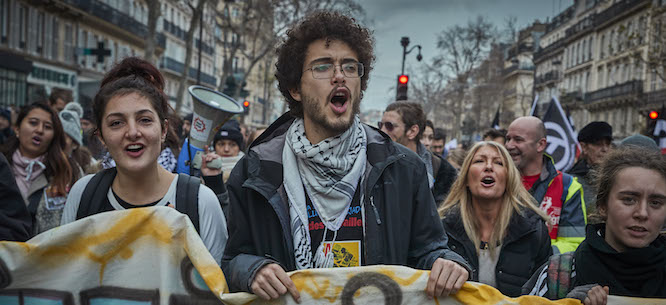
PARIS, FRANCE РDECEMBER 17: Protestors march through the streets of Paris chanting against President Macron as thousands take to the streets in support of the National Strike on a crucial day between the government and the unions over pension reforms on December 17, 2019 in Paris, France. President Emmanuel Macron is facing his biggest test since the Gilet Jaune or “Yellow Vest” movement as railway, transportation workers, Teachers, students, hospital employees, firemen, garbage collectors, truck drivers and airline workers join the strike called in protest to changes to France’s pension system. (Photo by Kiran Ridley/Getty Images)

Share
Workers across France have been on strike over pension reforms for six weeks now—what began with railway workers spread throughout the public sector and has given us dramatic photos of striking ballerinas and massive marches across Paris, but also extends into the energy sector and even to Amazon warehouses. This week saw the first big march since the holidays, as negotiations pick back up, and we talk with Dissent‘s own Colin Kinniburgh, now living in France as a freelance reporter who’s been covering the strike. He explains what President Macron wants to do with the French pension system, why protesters are occupying BlackRock offices, what this has to do with the gilets jaunes, and much more.
We also look in on a new effort to organize video games workers, the union-busting of Honduran fruit workers with Gabriela Rosazza of International Labor Rights Forum, the effects of California’s AB5 gig worker law on freelancers with Tia Koonse of UCLA Labor Center, and the closure of auto plants on opioid-related deaths. For Argh, we consider whether work is driving us to therapy (and whether therapy will solve our workplace problems) and the problems with treating sex workers as victims in need of intervention.

